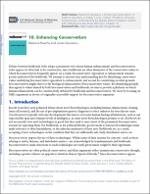Chapter 10 Enhancing Conservatism
| dc.contributor.author | Roache, Rebecca | |
| dc.contributor.author | Savulescu, Julian | |
| dc.date.accessioned | 2021-06-17T09:35:41Z | |
| dc.date.available | 2021-06-17T09:35:41Z | |
| dc.date.issued | 2016 | |
| dc.identifier.uri | https://library.oapen.org/handle/20.500.12657/49606 | |
| dc.description.abstract | Debate between bioliberals (who adopt a permissive view about human enhancement) and bioconservatives (who oppose it) often fails to be constructive, since bioliberals are often dismissive of the conservative values to which bioconservatives frequently appeal. As a result, bioconservative opposition to enhancement remains poorly understood by bioliberals. We attempt to increase this understanding first by identifying conservative values underlying bioconservative opposition to enhancement, and second by considering on what grounds bioconservatives might object to the biological enhancement of bioconservative values. By identifying grounds that appeal to values shared by both bioconservatives and bioliberals, we aim to provide a platform on which human enhancement can be constructively debated by bioliberals and bioconservatives. We close by focusing on Mill's arguments in favour of originality as possible support for bioconservative argument. | en_US |
| dc.language | English | en_US |
| dc.subject.classification | thema EDItEUR::P Mathematics and Science::PS Biology, life sciences::PSB Biochemistry | en_US |
| dc.subject.other | bioliberals; bioconservatives; human enhancement | en_US |
| dc.title | Chapter 10 Enhancing Conservatism | en_US |
| dc.type | chapter | |
| oapen.relation.isPublishedBy | b9501915-cdee-4f2a-8030-9c0b187854b2 | en_US |
| oapen.relation.isPartOfBook | 4df2449a-506a-4796-b39b-00c16041ac29 | en_US |
| oapen.relation.isFundedBy | d859fbd3-d884-4090-a0ec-baf821c9abfd | |
| oapen.collection | Wellcome | |
| oapen.pages | 13 | en_US |
| oapen.place.publication | Oxford | en_US |

